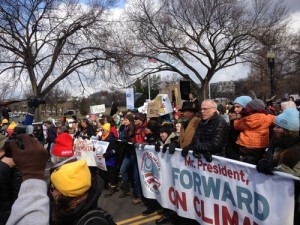United States Representative Steve Cohen (D - TN) spoke against the Keystone XL pipeline, on the House floor yesterday.
“When you brush aside the studies by TransCanada and other oil companies and you analyze the pure scientific studies,” said Rep. Cohen, “every analysis clearly demonstrates the Keystone XL pipeline poses major threats at every turn – in its extraction, its transportation, its refining, and its consumption – threats to our earth.”
Here’s the video of Cohen’s brief remarks.
And here’s the text:
Mr. Speaker, I rise today to share my grave concerns about the proposed Keystone XL Pipeline, the decision and existence of which is awaiting a decision by the Administration.
Last week, 84 of my colleagues (82 Republicans and 2 Democrats) introduced H.R. 3, a bill that would approve the construction and maintenance of the Keystone XL pipeline.
The world’s foremost climatologist, Dr. James Hansen—and one of the first scientists to warn of the dangers of burning carbon fuel and a partial recipient of the Nobel Peace Prize—has likened the building and use of the Keystone pipeline to the “lighting of a carbon bomb.” Game over.
When you brush aside the studies by TransCanada and other oil companies and you analyze the pure scientific studies, every analysis clearly demonstrates the Keystone XL pipeline poses major threats at every turn – in its extraction, its transportation, its refining, and its consumption – threats to our earth.
The truth of the matter is, the U.S. isn’t even going to be using those fossil fuels transported by the pipeline—they’re going straight to China.
In fact, the only proposed feasible method of getting those Canadian tar sands to China or any other country is by building the Keystone XL pipeline, to feed into the port in Houston, Texas.
I urge my colleagues to stop the Keystone XL Pipeline, avoid lighting that carbon bomb in our country. Oppose H.R. 3 and return our focus to initiatives that center on true energy independence through renewable resources and greener production.”
Cohen is one of 24 Representatives who comprise the Safe Climate Caucus — a group organized last month and headed by Rep. Henry Waxman (D-CA), who chairs the House Committee on Energy and Commerce.

